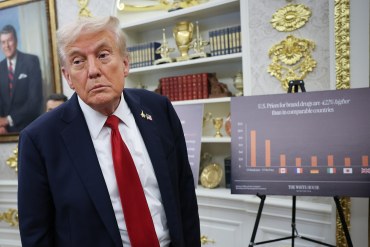Listen: Green Goodbyes: Choosing an Eco-Friendly Burial
Environmental and economic concerns prompt some people to explore obsequies options beyond metal caskets and cremation.
Listen: Why ‘TrumpRx’ Might Not Save You Money
On the “Today, Explained” podcast, KFF Health News’ Julie Rovner recaps the TrumpRx announcement and why the direct-to-consumer initiative may not save you money on prescription drugs if you have insurance through your employer or the government.
Where Jobs Are Scarce, Over 1 Million People Could Dodge Trump’s Medicaid Work Rules
Under a new law, many Americans will have to meet a work requirement to obtain and keep their Medicaid coverage. But due to an exemption, millions living in areas of high unemployment could be spared.
Listen: Young Adults Turning 26 Face Health Insurance Cliff
The erosion of the Affordable Care Act has created an insurance cliff for Americans who are turning 26 and don’t have a job that provides medical coverage. Scared off by high price tags and the complexity of picking a policy, some young adults are going without insurance.
Listen: The Surprising Power of Pushback When Health Insurance Won’t Pay
Denied coverage for preventive care? You’re not powerless. In this new episode of NPR’s “Life Kit” podcast, KFF Health News reporter Jackie Fortiér explores why denials happen and how to avoid common pitfalls.
Projected Surge in Uninsured Will Strain Local Health Systems
In South Texas’ Rio Grande Valley, many people go without health insurance, and the health system struggles as a result. Similar communities dot the nation, and more could face such difficulties under President Donald Trump’s tax-and-spending law.
RFK Jr.’s Vaccine Panel Expected To Recommend Delaying Hepatitis B Shot for Children
A federal vaccine panel, recently reshaped by Health and Human Services Secretary Robert F. Kennedy Jr., is expected to vote on delaying the hepatitis B shot for newborns. Pediatricians warn that could open the door to a comeback for a disease virtually eradicated among U.S. children.
Listen: Limiting Benefits and Adding Restrictions, ‘MAHA’ Reshapes Food Aid
The White House and congressional Republicans have made historic changes to the federal anti-hunger program SNAP. They say the changes will boost healthy eating for low-income Americans. Some nutrition experts aren’t so sure.
Medicaid Cuts Could Have Vast Ripple Effects in This Rural Colorado Community
In rural Colorado and across rural America, Medicaid is a lifeline, especially for people who wouldn’t otherwise have easy access to health care. That includes low-income seniors who need supplemental coverage in addition to Medicare, and people of all ages with disabilities.
Listen: Regulatory Rollbacks and Federal Layoffs Threaten America’s Food Supply
The Trump administration’s anti-regulatory approach and cost-cutting moves risk unraveling the system of checks and balances that helps ensure the safety of the U.S. food supply, say consumer advocates and former employees of the FDA and Department of Agriculture.
A Brain-Dead Pregnant Woman Was Kept Alive in Georgia. It’s Unclear if State Law Required It.
The anti-abortion movement is rallying around new laws that establish fetal “personhood.” Doctors are scrambling to adjust, but even conservatives don’t always agree on how such laws should be applied.
Listen: Some Scientists Speak Out on Deep Cuts to National Cancer Institute, While Others Flee
The U.S. has made enormous progress reducing cancer mortality since the 1990s, partly due to significant investment in research at the National Cancer Institute. But scientists say the Trump administration has been hollowing out the agency in its push to dramatically shrink the federal government.
Republicans Call Medicaid Rife With Fraudsters. This Man Sees No Choice but To Break the Rules.
Congressional Republicans successfully pushed to add hurdles to qualify for Medicaid by saying they would eliminate waste, fraud, and abuse. This is the story of a Montana man who explains why he said he is breaking the rules to keep his health insurance and his job.
$50B Rural Health ‘Slush Fund’ Faces Questions, Skepticism
Lawmakers added a $50 billion program for rural health to President Donald Trump’s massive tax and spending package with promises it would help plug the hole left by Medicaid cuts. Rural hospital and clinic leaders worry the infusion won’t reach the right places.
Lost in Translation: Interpreter Cutbacks Could Put Patient Lives on the Line
Recent federal reductions in funding for language assistance and President Donald Trump’s executive order designating English as the official language of the United States have some health advocates worried that millions of people with limited English proficiency will be left without adequate support and more likely to experience medical errors.
Q&A: What Does the Budget Bill Mean for Your Health?
KFF Health News chief Washington correspondent Julie Rovner answers listeners’ questions about how the “One Big Beautiful Bill” could affect health care in Washington, D.C., and beyond.
Listen: With Vital Health Research Defunded, Who’s Losing Out?
From Florida to California, National Institutes of Health grant cuts have halted research studies on HIV, vaccines, and health equity — affecting red and blue states alike.
RFK Jr. Says Healthy Pregnant Women Don’t Need Covid Boosters. What the Science Says.
Despite opposition by the leader of the Department of Health and Human Services, existing evidence on the safety and efficacy of getting a covid vaccine during pregnancy all points the same way: The shots are important for maternal and fetal health.
Opioid Settlement Windfall: Where the Billions Are Going
Opioid manufacturers, distributors, and retailers have been paying billions of dollars to settle lawsuits over their role in the overdose epidemic. How to spend the money remains an open question.
In Arizona County That Backed Trump, Conflicted Feelings About Cutting Medicaid
Medicaid plays a vital role in many rural communities that favored President Donald Trump in the 2024 election. But residents still seem open to Republican proposals to cut perceived waste in the program.


























